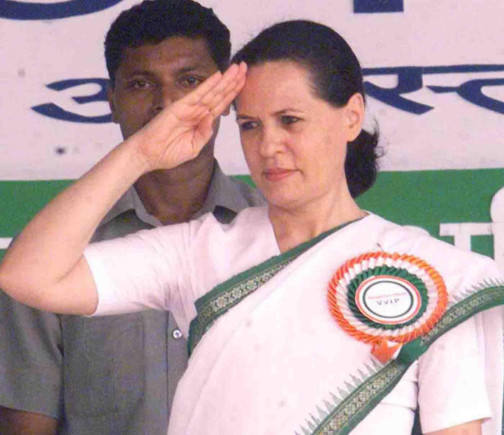
Would Sonia Gandhi’s heart have bled just as much for Indians who go to sleep hungry and wake up not knowing where their meal is coming from if she had been born in India instead of Italy? I doubt it.
Elections come and go but Sonia deserves the eternal gratitude of India’s poor for two landmark welfare laws: National Rural Employment Guarantee Act, 2005 and National Food Security Act, 2013. NREGA, the world’s biggest social security measure that covered every district of India by 2008, ensures 100 days of fully-paid unskilled manual work for every adult in rural areas each year, making income a legal right. And thanks to the 2013 law, which provides five kg of subsidised foodgrain per person per month to two-thirds of the country’s population, food is now a legal right in a nation ranked 65 out of 79 countries on the Global Hunger Index.
To “put food on the table” is a British phrase, which means providing food to a family so that it can survive. Sonia put not only food but also cash on the table! What more could the masses have bargained for? But gratitude, obviously, didn’t translate into votes at the hustings.
Self-inflicted damage
When Indians come to their senses and realise what a big ride Narendra Modi has taken them for, they are bound to curse themselves for not granting Sonia the mandate to rule for a third successive term. Realisation will dawn soon enough but who knows for how long they will have to wait before they can undo the self-inflicted damage!
Doom and gloom surround the Congress. But one thing is certain: Sonia’s name will be written in golden letters when historians take a closer and dispassionate look at her ten years in power as Prime Minister Manmohan Singh’s boss. She will emerge as a socialist godmother with a halo. When the poorest of the poor come out of their stupor, they are bound to hail Sonia as the gori rani, or India’s white queen.
Gori literally means light skinned; it’s also a byword for a beautiful woman. But in Sonia’s case, it straightaway means a white woman. As a European, she was outraged by starvation and poverty — harsh realities that most liberal Indians meekly accept. But Sonia put her foot down — she would have none of it. She was uncompromising when it came to the underprivileged and disadvantaged.
I’m absolutely sure that if Sonia wasn’t a foreigner — and that too a European — she wouldn’t have been so appalled by hunger and disease. Her political enemies may condemn her as an outsider but there is no gainsaying that Sonia has done poor Indians a world of good.
Sonia has stood India in good stead, as the saying goes. If the truth be told, even Sonia’s Indian-born son Rahul, is no patch on her when it comes to her concern for the wretched of the earth. Sonia pulled out all stops in her fight against poverty because it was alien to her — she hadn’t seen grinding poverty until she arrived in India.
Socialist bent
Sonia, as Congress president and United Progressive Alliance chairperson, compelled a dyed-in-the-wool capitalist-economist like Dr Singh to enact NREGA and the Food Security Act. Other right-wingers in high places wedded to a market economy also opposed subsidies for the poor. But Sonia dismissed their arguments and dictated socialist policies.
The biggest argument mounted last year against the anti-hunger bill was that it would hike subsidies on food to a record $23 billion (Dh84.46 billion) making it impossible for India to cut its fiscal deficit to a “tolerable” 4.1 per cent of GDP from an “intolerable” 5.5 per cent. But as the hungry-people-versus-fiscal-responsibility debate raged, Sonia threw her weight behind the former, clearing the decks for the food security law.
Sonia chaired the National Advisory Council — the most powerful club of “bleeding hearts” influencing Dr Singh. NAC urged the government to “intervene with huge amounts of money to protect the poor, even at the cost of slowing down economic growth.” Leftist Aruna Roy, a key member, admitted: “Sonia Gandhi’s sympathy for the poor is very genuine. Therefore any issue that we took up got an immediate response. She listened very carefully and was moved.”
But Sonia raised the hackles of capitalist hawks like Sujit S. Bhalla who slammed her for ballooning welfare expenditure and economic growth slumping to 4.5 per cent last year from 9.8 per cent in 2007. “The irresponsibly socialist economic policies Sonia recommends are patently destructive. There is no reformer or reform-oriented policy that has not been negatively touched by her policies and leadership, given her influence on Indian policies,” wrote Bhalla.
But why did beneficiaries of Sonia’s socialism desert the Congress? My explanation is that instead of being grateful, they were overpowered by greed and fell for Modi’s promise to usher in even better days — which is unlikely given the BJP’s pro-business bias. Those who betrayed Sonia.and reposed their faith in Modi will rue the day they voted for him.
Remarkably, Sonia has stuck to her guns even in defeat. Speaking on the occasion of the 50th death anniversary of Jawaharlal Nehru, soon after the rout, she said: “Despite being fundamentally challenged in the prevailing political climate, Congress remains profoundly wedded to Nehru’s concern for the weakest sections of society.”
“The core of Nehruvian socialism”, Sonia declared without an iota of remorse or misgiving, “is the conviction that in a land of poverty and inequality, the government’s objective must be the welfare of the poorest, most deprived and most marginalised.”
— S. N. M. Abdi is a noted Indian journalist and commentator.









